Are essential oils the nature-derived solution to enhancing health and well-being? These potent plant extracts, revered for centuries, are returning to the spotlight, boasting benefits from stress reduction to pain management. Popular oils like lavender and peppermint offer a natural route to improved wellness. This article delves into the science-backed benefits of essential oils, exploring their potential to naturally boost health without harsh chemicals. Prepare to unlock the secrets of essential oils and transform your wellness journey with these remarkable natural agents.
Understanding Essential Oils for Health
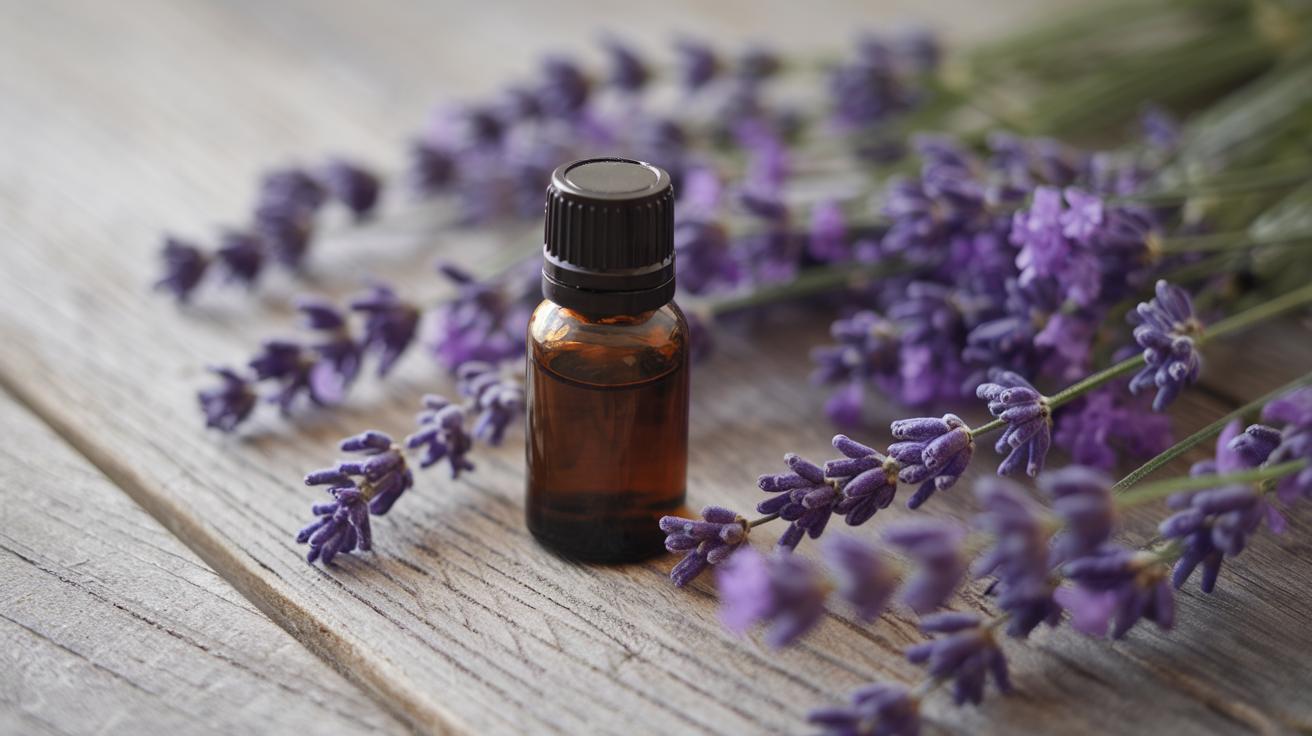
Essential oils are highly concentrated plant extracts obtained through distillation or cold pressing, capturing the plant's scent and flavor. These oils contain the essence of the plant's chemical properties, renowned for their therapeutic benefits. The extraction process is crucial as it determines the purity and potency of the oil. Distillation typically involves steaming plant materials, allowing the essential oil to separate from the water and plant matter. Cold pressing, used for citrus oils, involves mechanically pressing the plant to release the oils. These methods ensure that essential oils retain their natural therapeutic qualities, making them valuable for health applications.
Incorporated into various wellness practices, essential oils serve to enhance both mental and physical well-being. They are widely used in aromatherapy, where inhalation of the oils activates brain regions that influence emotions and the limbic system. This practice is known for reducing stress and anxiety, promoting relaxation, and improving sleep quality. Furthermore, essential oils can be applied topically, often diluted with carrier oils, to manage pain and inflammation. Their antimicrobial and antioxidant properties also aid in immune support and skin health. The versatility of essential oils makes them a popular choice for those seeking natural remedies for common health concerns.
- Lavender: Known for reducing stress and promoting sleep.
- Tea Tree: Offers antimicrobial benefits, supporting skin health.
- Eucalyptus: Aids respiratory wellness and congestion relief.
- Peppermint: Alleviates headaches and improves digestion.
- Chamomile: Promotes relaxation and soothes inflammation.
The efficacy of essential oils is supported by scientific research, highlighting their interaction with the body's physiological systems. Compounds in essential oils, such as terpenes and esters, interact with the nervous system and affect neurotransmitter activity. This interaction underlies their ability to alter mood, reduce pain, and modulate immune responses. While more rigorous studies are needed to fully understand their mechanisms, existing research validates the therapeutic potential of essential oils, making them a credible option for complementary health strategies.
Health Benefits and Uses of Essential Oils
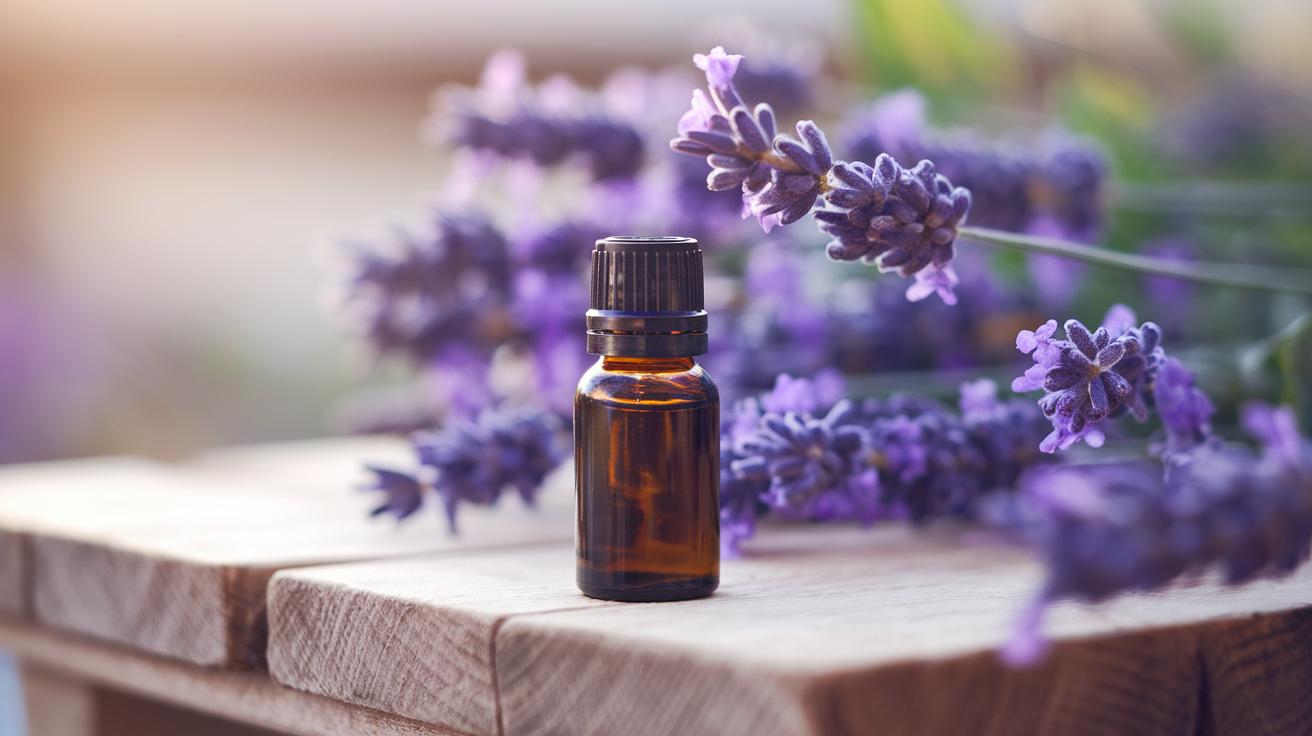
Essential oils are versatile tools in the wellness arsenal, offering a myriad of benefits that support both physical and mental health. Through various applications, including aromatherapy, topical use, and ingestion in small doses, essential oils can enhance well-being and address specific health concerns.
Stress and Anxiety Relief
Lavender and bergamot essential oils are frequently employed to alleviate stress and anxiety. How do these oils work to reduce stress? Lavender and bergamot interact with the brain's limbic system, modulating neurotransmitter activity to promote relaxation and decrease cortisol levels. Their calming properties make them effective in reducing symptoms of anxiety, often used in diffusers or applied topically to pressure points, aiding in mood stabilization and mental clarity.
Sleep Improvement
Oils such as chamomile and lavender are renowned for their ability to enhance sleep quality. How do these oils improve sleep? They facilitate relaxation by increasing gamma-aminobutyric acid (GABA) activity in the brain, a neurotransmitter that helps calm nervous activity. This effect promotes a conducive environment for sleep, making these oils popular choices for those struggling with insomnia or disrupted sleep patterns. Aromatherapy with these oils can help establish a restful nighttime routine.
Antimicrobial Properties
Tea tree and eucalyptus oils are celebrated for their antimicrobial effects. How do these oils prevent infections? Their active compounds, such as terpinen-4-ol in tea tree oil, have been shown to inhibit the growth of bacteria, viruses, and fungi. These oils can be applied topically, often diluted, to treat minor cuts, abrasions, or skin conditions. They are also used in diffusers to purify air and surfaces, contributing to a healthier living environment.
Pain and Inflammation Relief
Peppermint and rosemary oils are utilized for their analgesic and anti-inflammatory properties. How can these oils manage pain? They contain compounds like menthol and camphor, which provide a cooling sensation and reduce inflammation. These oils are effective in alleviating headaches, muscle aches, and joint pain. Topical application, particularly in diluted form, can offer targeted relief, enhancing physical comfort and mobility.
The therapeutic benefits of essential oils are diverse, with each oil offering unique properties that support health and wellness. From stress reduction to antimicrobial action, their natural compounds interact with the body's systems, providing complementary options for managing various health issues.
Safe Usage and Potential Risks of Essential Oils
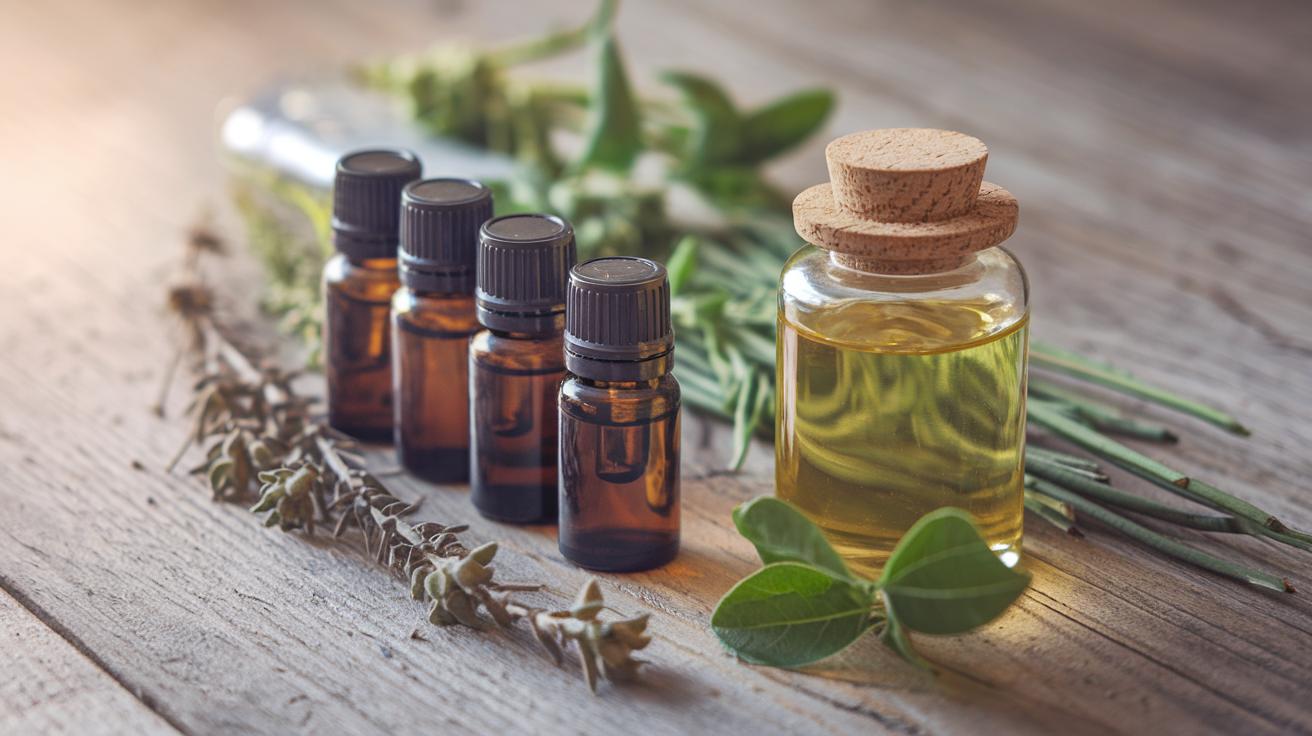
Essential oils are powerful plant extracts that demand cautious handling to mitigate adverse effects. Why is it crucial to use essential oils safely? Precision in safe application is vital due to their high concentration, which can lead to skin irritation, allergic reactions, or interactions with medications. The absence of FDA regulation means there is no standardized dosage, requiring users to exercise personal responsibility in their application. Proper dilution with carrier oils is essential when applying topically to avoid skin sensitivity. Inhalation and topical use are generally safe when adhering to recommended guidelines, but ingestion should only occur under professional guidance.
- Dilute oils with carrier oils.
- Perform patch tests before extensive use.
- Use recommended amounts and avoid ingestion unless advised.
- Store oils away from children and pets.
Potential risks associated with essential oil use include allergic reactions and medication interactions, necessitating careful consideration. How can one reduce these risks effectively? Conducting a patch test on a small skin area can reveal sensitivity before broader application. Consultation with healthcare providers is advised, particularly for individuals with pre-existing health conditions or those on medication. Such precautions ensure that essential oils can be integrated safely into wellness routines, optimizing their health benefits while minimizing risks.
Popular Essential Oil Blends for Health
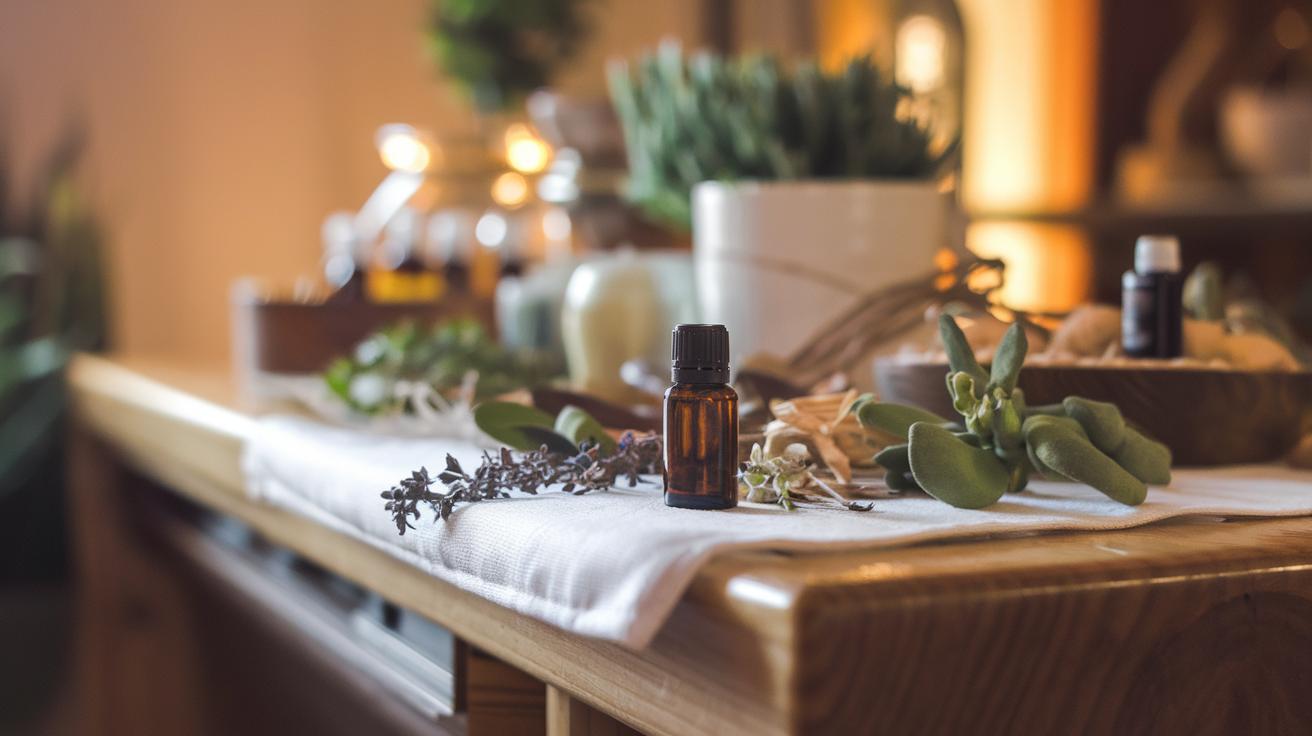
Blending essential oils enhances their therapeutic properties by combining the strengths of individual oils to create a synergistic effect. This process allows for the formulation of specialized blends that target specific health concerns, providing a more comprehensive approach to wellness. By mixing various essential oils, users can achieve a balanced blend that maximizes the benefits of each component, resulting in improved efficacy for health applications. Blends like On Guard and Breathe are renowned for their immune and respiratory support, showcasing the power of combining different oils for holistic health management. These blends can be diluted with carrier oils for topical application or used in diffusers to disperse their aromatic compounds into the air, facilitating inhalation and absorption.
|Blend Name|Ingredients|Health Benefits|
|—|—|—|
|On Guard|Wild Orange, Clove, Cinnamon, Eucalyptus, Rosemary|Immune system support|
|Breathe|Laurel Leaf, Peppermint, Eucalyptus, Melaleuca, Lemon|Respiratory health enhancement|
|Stronger|Cedarwood, Litsea, Frankincense, Rose|Mild immune support for children|
Effective use of essential oil blends involves understanding their application methods to maximize health benefits. Blends can be diffused to purify the air and support respiratory health or diluted with carrier oils for safe topical application. When applied to the skin, these blends should be used on pulse points, such as the wrists or neck, or massaged onto the feet or spine for optimal absorption. For those seeking to enhance their health regimen, incorporating these blends can offer targeted support, aiding in immune function and respiratory wellness while promoting overall vitality.
Essential Oils for Specific Health Issues
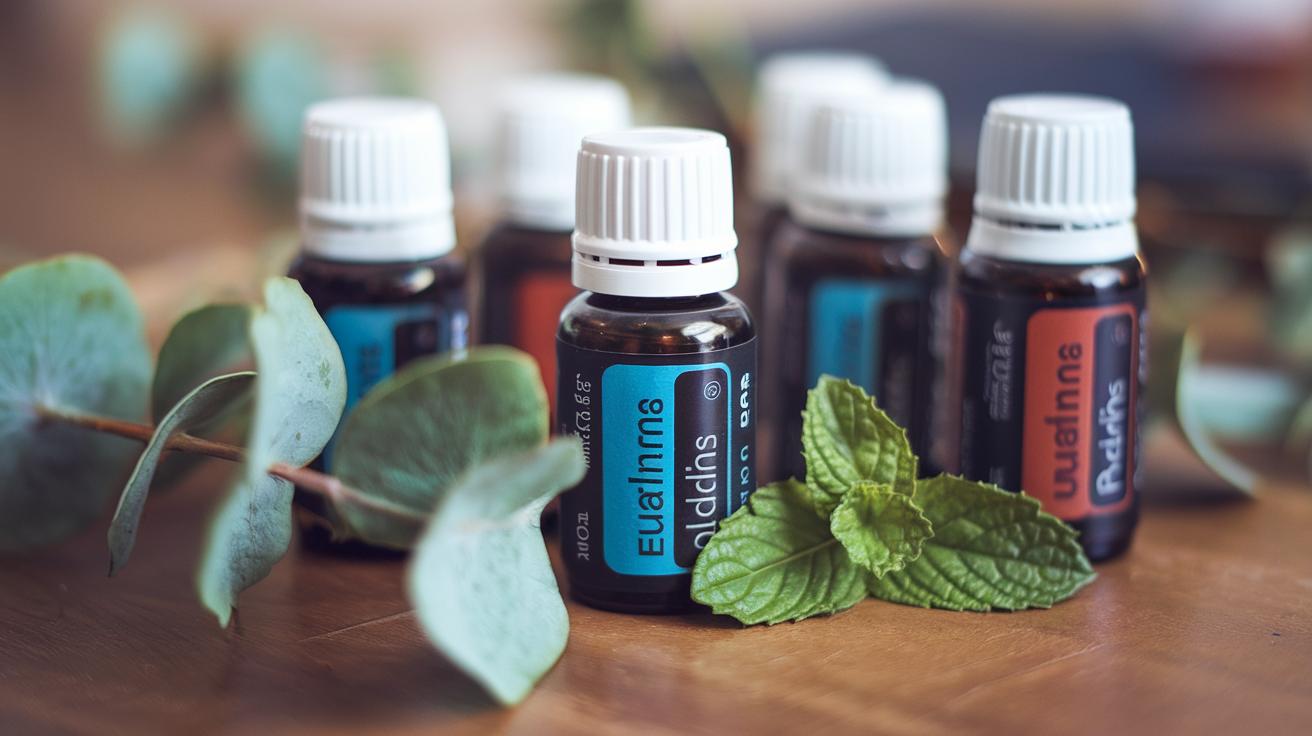
Essential oils offer targeted therapeutic benefits for various health concerns, making them a valuable addition to holistic wellness practices. By selecting specific oils, individuals can address issues like respiratory health, digestive support, and skin conditions. This approach utilizes the natural properties of essential oils to complement traditional treatments and promote overall well-being.
Respiratory Health
How do eucalyptus and peppermint oils support respiratory wellness? Eucalyptus oil contains compounds like eucalyptol, which can help clear nasal passages and support respiratory function. Peppermint oil, with its menthol content, provides a cooling sensation and can aid in opening airways, making it easier to breathe. These oils can be diffused or inhaled directly to alleviate symptoms of congestion and improve breathing ease. Their anti-inflammatory and expectorant properties make them effective in managing conditions such as colds, sinusitis, and allergies.
Digestive Support
What essential oils are beneficial for digestion? Ginger and fennel oils are renowned for their digestive aid properties. Ginger oil contains gingerol and other compounds that help soothe the gastrointestinal tract, reducing symptoms of nausea and indigestion. Fennel oil, rich in anethole, can relieve bloating and discomfort by relaxing the muscles in the digestive tract. These oils can be used in aromatherapy or diluted with a carrier oil and applied to the abdomen to support digestive health, offering natural relief from common digestive issues.
Skin Health
Which essential oils are effective for skin conditions? Tea tree oil and rose oil are popular choices for enhancing skin health. Tea tree oil has antimicrobial and anti-inflammatory properties, making it effective in treating acne and minor skin infections. Rose oil, with its antioxidant and moisturizing qualities, helps improve skin texture and reduce redness, promoting a healthy complexion. These oils can be applied topically in diluted form to target specific skin concerns, providing a natural alternative to conventional skin treatments.
The potential of essential oils as a complementary therapy lies in their ability to interact with the body's physiological processes. By selecting the appropriate oils for specific health issues, individuals can enhance their well-being naturally, utilizing the therapeutic properties of essential oils to support traditional healthcare strategies.
Final Words
Exploring essential oils for health unveils their potential in enhancing physical and mental well-being. These plant extracts offer benefits ranging from stress relief to improved sleep and health through antimicrobial properties. While widely appreciated in aromatherapy and as topical treatments, understanding safe usage and potential risks is crucial for reaping their therapeutic benefits.
As essential oils gain popularity, they present a valuable complement to conventional treatments. By integrating these natural remedies into daily routines, individuals may experience improved overall health and wellness, underlining the importance of informed and cautious application.
FAQ
What are essential oils and their uses?
Essential oils are plant extracts used for their therapeutic properties, aiding in stress reduction, sleep improvement, nausea relief, and pain management through inhalation, topical application, or limited ingestion.
Can you provide a list of essential oils and their benefits?
Popular essential oils include lavender for relaxation, eucalyptus for respiratory health, peppermint for digestive aid, tea tree for antimicrobial properties, and chamomile for sleep enhancement.
How to safely use essential oils on the skin?
To use essential oils on the skin, dilute them with carrier oils and perform a patch test. This method reduces the risk of skin irritation or allergic reactions.
Are there side effects to using essential oils?
Using essential oils can cause allergic reactions or interact with certain medications. It is vital to use them cautiously and consult healthcare professionals if in doubt.
Which essential oils are toxic to humans?
Essential oils like wintergreen and camphor can be toxic if ingested or improperly applied. Always follow usage guidelines and consult a professional when necessary.
Do essential oils really have health benefits?
Yes, essential oils can offer health benefits such as stress relief, sleep improvement, antimicrobial effects, and pain management, supported by various scientific studies.
What is considered the most healing essential oil?
Lavender is often regarded as the most versatile and healing essential oil, known for its calming, anti-inflammatory, and antimicrobial properties.
How to effectively use essential oils for health?
Essential oils can be used effectively in diffusers for inhalation, diluted in carrier oils for topical application, or cautiously ingested if recommended by a professional.
Which essential oil has the most extensive range of benefits?
Lavender oil provides a wide range of benefits, including stress reduction, sleep aid, skin healing, and antimicrobial effects, making it a versatile choice for various health improvements.


